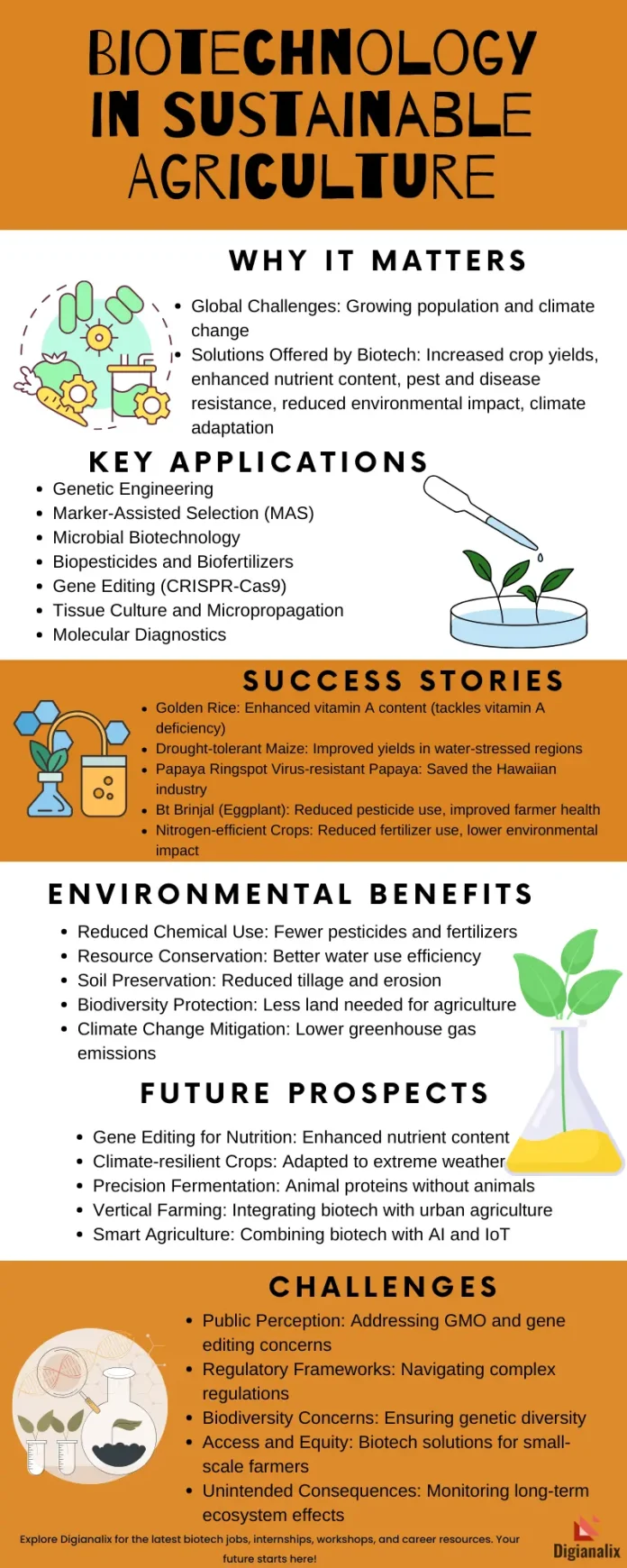“Harnessing Science to Feed the World Sustainably”
Hey there, eco-conscious biotech enthusiasts! 👋 Ready to explore how biotechnology is revolutionizing agriculture and helping us feed the world sustainably? Let’s dive into the exciting world where biology meets farming!
🌱 Why biotechnology in agriculture matters
As our global population grows and climate change intensifies, we face unprecedented challenges in food production. Sustainable agriculture is no longer just an option – it’s a necessity. Biotechnology offers innovative solutions to:
- Increase crop yields
- Enhance nutrient content
- Improve pest and disease resistance
- Reduce environmental impact
- Adapt crops to changing climates
Let’s explore how biotech is making waves in the fields!
🧬 Key biotechnology applications in agriculture
- Genetic engineering
- Creating crops with enhanced traits (e.g., drought resistance, pest resistance)
- Example: Bt cotton, which produces its own insecticide
- Marker-assisted selection (MAS)
- Using genetic markers to speed up traditional breeding
- Impact: Faster development of crops with desired traits
- Microbial biotechnology
- Harnessing beneficial microorganisms for soil health and plant growth
- Example: Nitrogen-fixing bacteria to reduce fertilizer use
- Biopesticides and biofertilizers
- Developing eco-friendly alternatives to chemical pesticides and fertilizers
- Case study: Bacillus thuringiensis (Bt) based biopesticides
- Gene editing (CRISPR-Cas9)
- Precise modification of plant genomes for improved traits
- Potential: Creating climate-resilient crop varieties
- Tissue culture and micropropagation
- Rapidly producing disease-free, high-quality plant seedlings
- Application: Large-scale production of banana and potato plants
- Molecular diagnostics
- Early detection of plant diseases for timely intervention
- Tool: PCR-based kits for identifying crop pathogens
🌾 Sustainable agriculture success stories
Let’s look at some real-world examples of biotech in action:
- Golden Rice
- Biofortified rice with enhanced vitamin A content
- Impact: Addressing vitamin A deficiency in developing countries
- Drought-tolerant maize
- Developed through both genetic engineering and advanced breeding
- Result: Improved yields in water-stressed regions of Africa
- Papaya ringspot virus-resistant papaya
- Saved the Hawaiian papaya industry from a devastating virus
- Technique: Genetic engineering to introduce virus resistance
- Bt Brinjal (eggplant)
- Reduced pesticide use in eggplant cultivation
- Benefit: Improved farmer health and reduced environmental impact
- Nitrogen-efficient crops
- Engineered to use nitrogen more efficiently
- Outcome: Reduced fertilizer use and lower environmental impact
🌿 Environmental benefits of biotech in agriculture
- Reduced chemical use: Less pesticides and fertilizers
- Conservation of resources: Improved water use efficiency
- Soil preservation: Reduced tillage and erosion
- Biodiversity protection: Less land needed for agriculture
- Climate change mitigation: Lower greenhouse gas emissions from farming
🧪 Emerging trends and future prospects
- Gene editing for nutrition: Enhancing nutrient content of staple crops
- Climate-resilient crops: Developing plants adapted to extreme weather
- Precision fermentation: Producing animal proteins without animals
- Vertical farming: Integrating biotech with urban agriculture
- Smart agriculture: Combining biotech with AI and IoT for optimized farming
🤔 Challenges and considerations
While promising, agricultural biotechnology faces some hurdles:
- Public perception: Addressing concerns about GMOs and gene editing
- Regulatory frameworks: Navigating complex and varying regulations globally
- Biodiversity concerns: Ensuring genetic diversity in crop species
- Access and equity: Making biotech solutions available to small-scale farmers
- Unintended consequences: Monitoring long-term effects on ecosystems
💼 Career opportunities in agricultural biotechnology
Excited about this field? Consider these roles:
- Plant geneticist
- Agricultural biotechnologist
- Crop improvement specialist
- Bioinformatician for crop genomics
- Sustainable agriculture consultant
- Regulatory affairs specialist in agbiotech
🌍 The bigger picture
Agricultural biotechnology is not just about increasing yields – it’s about creating a more sustainable and resilient food system. By reducing environmental impact, adapting to climate change, and improving nutrition, biotech is playing a crucial role in achieving global food security and sustainability goals.
🤔 What’s your take?
How do you see biotechnology shaping the future of agriculture? Are you excited about its potential, or do you have concerns? Share your thoughts in the comments below!
Stay connected with the latest developments in agricultural biotechnology by subscribing to our site. Let’s work together towards a more sustainable and food-secure future!




